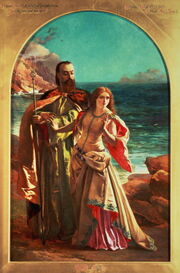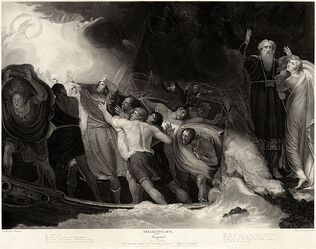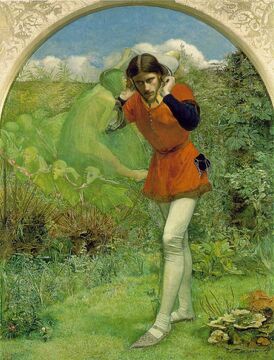
Prospero and Miranda from a painting by William Maw Egley; ca. 1850
- William Shakespeare’s The Tempest is most likely the last play ever written by the legendary English playwright. The Tempest is a story of a powerful sorcerer Prospero and his daughter Miranda, who are stranded for twelve years on an island with two servants a spirit Ariel and a monstrous looking being Caliban. Prospero was a Duke of Milan until his brother Antonio, and cohort Alonso King of Naples exiled him and his daughter. Gonzalo, the king’s counselor, secretly stocked their boats with a lot of supplies from them to survive. When they arrive on this island, Prospero made Caliban, who was the island’s native, a slave, because Caliban tried to violate Miranda when they arrived. One day, there was a shipwreck and Alonso, Ferdinand his son, Sebastian his brother, Antonio the current Duke of Milan, Gonzalo, Adrian, Francisco, Trinculo, and Stefano were swept onto the island. Ferdinand later fell in love with Miranda, but Prospero wanted to test Ferdinand. Alonso thought his son had died. Stefano, Alonso’s butler, discovered Caliban, and the two planned to murder Prospero, marry Miranda, and rule the island. In the end Prospero manipulated Alonso, Antonio, and Sebastian into meeting him. He forgave them of all their wrong doings and allows Ferdinand and Miranda to get married and abandon all his former magic.
The Tempest in the Waste Land
"Musing upon the king my brother’s wreck
And on the king my father’s death before him."

The Tempest
In The Tempest, after the Prospero's father died, Prospero becomes the rightful Duke of Milan. Because of jealousy, his brother abandoned him on an island so that he can be King. After several years of mastering his magic skills, Prospero revenges on his brother by summoning a strom to wreck his ship. This reference expresses Eliot’s view on the modern world, hopelessness and stranded. People can turn their back on each other, even to their family, because of jealousy and vegeance.

Ferdinand Lured by Ariel by John Everett Millais, 1851
"This music crept by me upon the waters"
FERDINAND
Where should this music be? i' the air or the earth?
It sounds no more: and sure, it waits upon
Some god o' the island. Sitting on a bank,
Weeping again the king my father's wreck,
This music crept by me upon the waters,
Allaying both their fury and my passion
With its sweet air: thence I have follow'd it,
Or it hath drawn me rather. But 'tis gone.
No, it begins again.
ARIEL sings
"This music crept by me upon the waters" is an allusion to The Tempest Act I, Scene III when Ferdinand found himself on the island and Prospero ordered the servant spirit Ariel to lure him towards Prospero and Miranda. The allusion is meant to be a transition transporting the reader to a different destination, Queen Victoria Street. The "waters" appear once again as a common theme of fertility.